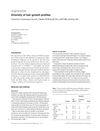Search
forProducts matching "common baldness"
Tracking 1 products like 180 Coverit 2% 60ml from by companies like ReliableRxpharmacy. View product »
Sort by
Research
390-420 / 1000+ results
research Fundamentals
Finasteride and minoxidil are effective, low-risk treatments for male hair loss, and patient education on these therapies is important.

research Biochemical and Trichological Characterization of Diffuse Alopecia in Women
Diffuse alopecia in women may be related to androgens and iron deficiency, and basic hormone and nutrient screening is useful.

research Inhibition of Hair Growth by Testosterone in the Presence of Dermal Papilla Cells from the Frontal Bald Scalp of the Postpubertal Stumptailed Macaque
Testosterone can slow down hair growth when combined with certain cells from bald scalps, and this effect can be blocked by an androgen receptor blocker.

research Female Pattern Hair Loss: An Overview with Focus on the Genetics
Different genes cause Female Pattern Hair Loss compared to male hair loss, and treatments vary, but more research is needed to understand it fully.

research Alopecia Areata: Pathogenesis And Treatment
No single treatment is consistently effective for alopecia areata, and more research is needed.

research Finasteride Treatment of Hair Loss in Women
Finasteride may help some women with hair loss, but better options exist.

research The Treatment of Female Pattern Hair Loss and Other Applications of Surgical Hair Restoration in Women
Hair transplantation helps women with hair loss; understanding and empathy lead to happy patients.

research Frequency of Body Dysmorphic Disorder Among Patients With Complaints of Hair Loss
Patients with hair loss are much more likely to have body dysmorphic disorder than general dermatology patients.

research Dutasteride Micro-Injections in Androgenetic Alopecia
Small injections of dutasteride improved hair thickness in men with hair loss without major side effects.

research Decreased Serum Ferritin Is Associated With Alopecia in Women
Low iron levels may be linked to some types of hair loss in women.

research Is Topical Minoxidil Solution Effective on Androgenetic Alopecia in Routine Daily Practice?
Minoxidil solution had low effect, causing 99% to stop using it.

research Managing Patterned Hair Loss – A Hair Raising Task!
Hair loss can be managed with treatments like minoxidil, finasteride, and others, but there are still gaps in effectiveness and off-label usage is increasing.

research Hair Loss and Herbs for Treatment
Herbs can potentially treat hair loss by inhibiting a key enzyme and promoting hair growth, and deficiencies in zinc, biotin, and iron are linked to hair loss.

research Effectiveness and Safety of Botulinum Toxin Type A in the Treatment of Androgenetic Alopecia
BTA safely and effectively treats hair loss, and works better with FNS.

research Physiology and Medical Treatments for Alopecia
Minoxidil, finasteride, and low-level laser light therapy are effective FDA-approved treatments for hair loss.
research Noninvasive Hair Rejuvenation
Noninvasive treatments like PRP and laser therapy can effectively promote hair growth and reduce hair loss.

research Hair Loss Pattern Due to Chemotherapy-Induced Anagen Effluvium: A Cross-Sectional Observation
Chemotherapy often causes patterned hair loss, with some scalp areas more resistant to hair loss than others.

research Alopecia: Overview, Causes, and Current Treatment Options
Early diagnosis is crucial for treating alopecia effectively.

research Diversity of Hair Growth Profiles
Different ethnic groups have unique hair growth patterns, with African hair growing slower and less dense, Asian hair growing fast but sparse, and Caucasian hair being densest; men are more likely to experience hair loss than women.

research Alopecia
The document concludes that alopecia has significant social and psychological effects, leading to a market for hair loss treatments.

research Nanostructured Drug Delivery Systems for Targeting 5-Alpha-Reductase Inhibitors to the Hair Follicle
Nanostructured delivery systems could potentially improve hair loss treatment by targeting drugs to hair follicles, reducing side effects and dosage, but the best size, charge, and materials for these systems need further investigation.

research Androgenetic Alopecia – Current Status
The document discusses male and female pattern hair loss, its diagnosis methods, FDA-approved treatments like finasteride and minoxidil, their side effects, and the role of lifestyle changes.
research Toward an Effective Treatment of Androgenetic Alopecia?

research A Comparative Study of Microneedling with Platelet-Rich Plasma Plus Topical Minoxidil (5%) and Topical Minoxidil (5%) Alone in Androgenetic Alopecia
Microneedling with platelet-rich plasma and minoxidil improves hair growth more than just minoxidil in men with hair loss.
research Low-Level Laser Therapy in Androgenetic Alopecia: Narrative Review
Low-level laser therapy is a safe and effective treatment for hair loss.
research Skin Care Physicians' Insight on Epidemiological Patterns, Diagnosis, and Treatment Modalities for Female Pattern Hair Loss
Dermatologists prefer minoxidil for mild female hair loss and a combination of PRP and minoxidil for severe cases, with a need for universal treatment guidelines.

research A Natural Product That Accelerates Hair Growth in Women with Chemotherapy-Induced Alopecia
A lotion with natural extracts significantly sped up hair growth in women with hair loss from chemotherapy.
research Effect of Cyclosporin on Hair-Existing Area of Nude Mice
Cyclosporin extends hair growth in mice, but high-dose corticosteroids block this effect.
research Effectiveness of the Active Ingredients (Capixyl, Procapil, and Rosemary Extract) of the Trust Tonic for the Treatment of Androgenetic Alopecia in Comparison to Minoxidil
The Trust tonic is more effective than minoxidil for treating hair loss.